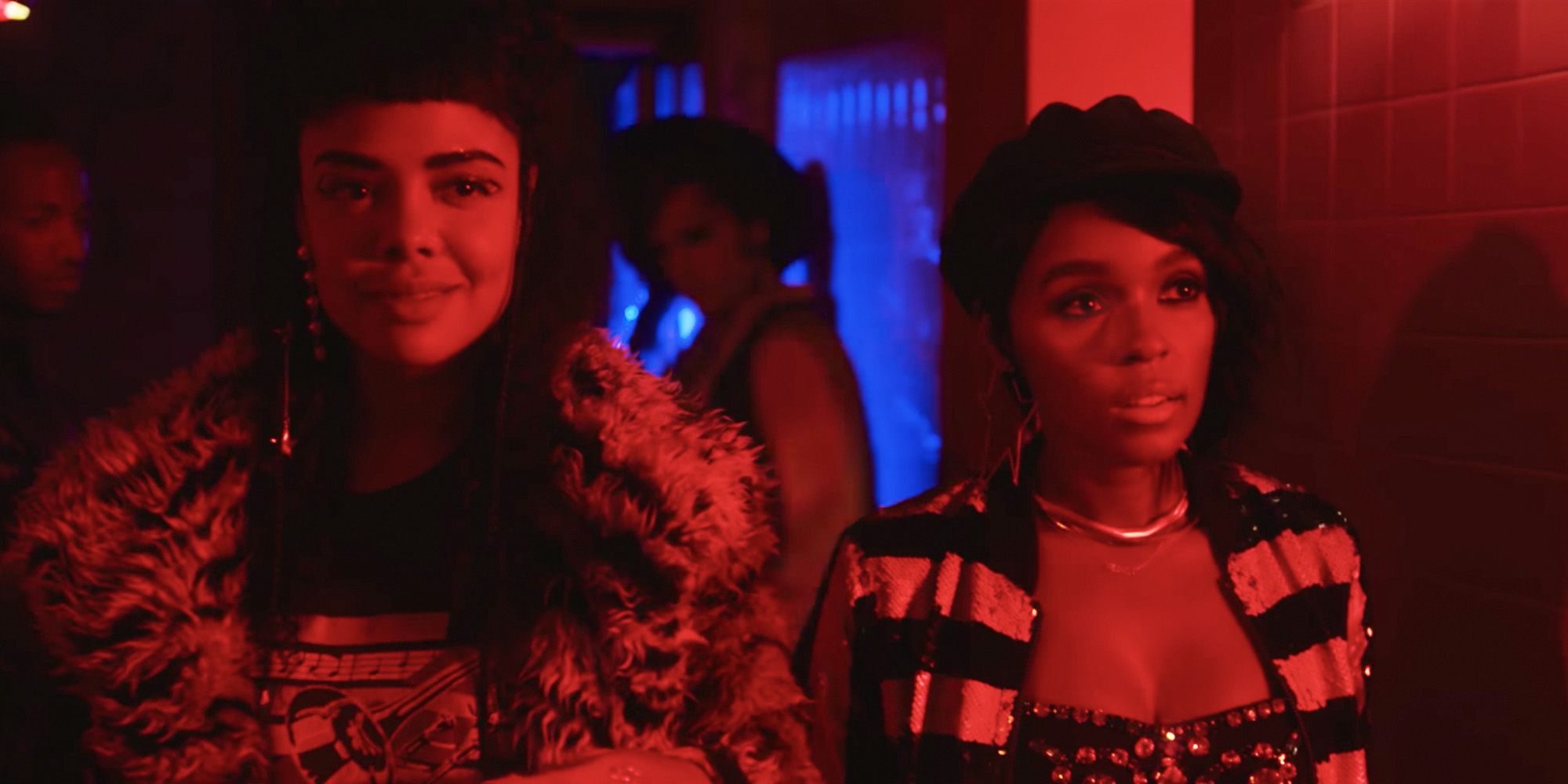Jane and Mary Don't Subscribe to A Butch-Femme Binary
Mary Apple 53 (Tessa Thompson) and Jane 57821 (Janelle Monaé) are the black lesbian lovers at the center of Dirty Computer's Emotion Picture.
Fans of Janelle Monáe have long wondered if queerness is a part of her identity, given the hints she’s dropped in previous music like her hit “Q.U.E.E.N,” as well as her strong support and knowledge of the LGBTQ community.
However, her recent coming out as bisexual/pansexual in a feature by Rolling Stone confirmed the hopes of many of her queer fans. I watched as friends on social media took to Twitter and Facebook to proclaim their gladness and celebrate their brand new queer icon.
Quickly following her coming out, Janelle Monáe released an “Emotion Picture” to accompany her newest album, Dirty Computer, which provides visuals to an album celebrating Monáe’s fluid sexual identity in a world where society would prefer that she doesn’t celebrate. Watching the “Emotion Picture”, I couldn’t help but focus most of my attention on the portrait of the two characters played by Janelle Monáe and actress Tessa Thompson: Jane 57821 and Mary Apple 53, respectively. Jane 57821’s memories in the film, which were facing erasure by the forces which captured her, revealed Jane and Mary as tenderly in love.
As a bisexual woman, it’s important for me to see women loving women normalized. It’s especially important to see black women loving black women. So often, black, bi+ or lesbian women are paired off with white (or white-passing) lovers, like in the lesbian classic TV series, The L Word, or in Cheryl Dunye’s The Watermelon Woman. In addition, Ava DuVernay and Oprah Winfrey's fictional drama Queen Sugar features several episodes where journalist Nova Bordelon dates a black, female activist, only to have the relationship end after several episodes, while Bordelon’s longest relationships on the show are with cis men. The lack of representation of women loving women within the mainstream has left me feeling that romantic and sexual love between black women isn’t important enough, and that whiteness or maleness always has to intervene in our love lives if they are to count.
As black women who love each other, Jane and Mary’s relationship offers a contrast to these narratives, but what stands out to me is that these characters don’t subscribe to the butch-femme binary. The existence of these characters helps me through my own anxieties as a woman who loves women and the many rules and expectations from within and from outside the LGBTQ community.
Melanie (Michele Marcus) and Lindsey (Thea Gill) from Showtime's Queer As Folk are one example of a butch-femme lesbian relationship.
"Butch" and "femme" are words with complicated histories, and the definitions for these terms are as diverse as those within queer and trans communities. I won’t get into too much detail trying to describe what butch and femme is for everybody, but they are identities of expression in queer and trans cultures. Ultimately, “femme” and “butch” describe queer and trans people’s aesthetic, sexual and even political identities. Removing these identities from the context of LGBTQ struggles can have consequences for these already marginalized communities.
When I talk about a “butch-femme binary,” I’m talking about an expectation that people who align themselves with a butch identity must only be attracted to people who are femme, and vice versa. This is not saying that butch-femme relationships are bad or that they need to be transcended. Rather, the butch-femme binary can at times mimic strict gender roles from the heterosexual world, and people may put undue pressure on each other to conform to rigid rules about how to behave, who to date, and what to wear.
Femme expression is often seen as a product of the heterosexual male gaze: femininity only exists for men to consume. This tends to render femmes who love femmes as unreal. Monáe is constantly reminding us that she is not for male consumption, suggesting that she refuses to have her love life controlled or defined by the narratives created by a patriarchal society. Monáe has always been private about the details of her relationships with the men and women whom she loves, suggesting too, that how she views her own sexuality is more important to her than what the media or culture thinks of it. Also femmes who love femmes are often hypersexualized or subject to scrutiny inside and outside queer women’s culture, they are not the only ones unserved by strict expectations on how to be a queer woman.
I recently watched a documentary called The Same Difference, which follows several groups of butches, studs and other masculine-presenting women as they worked through the joys and the struggles of figuring out and owning their gender expression and sexuality. I found myself interested in one particular couple: two butch women whose affections and desires were reserved for other butch women. Because these two women were dating each other and were not particularly attracted to femmes, they were often ridiculed by their queer community. Another woman in the documentary, a stud, chose to become pregnant and would struggle with peers who didn’t support her decision to carry a baby. Her pregnancy was seen as existing outside of her gender expression as a woman who presented masculine. These two stories illustrate just a few ways in which masculine presenting women are often expected to conform to rules about what it means to be a lesbian or bi+. The classifications of “butch” and “femme”, among others, were meant to help queer women to be more themselves and to give voice to who they are, but instead were being used to invalidate the self expression of individuals in the film.
Seeing resistance to stereotypes about how to be a queer woman gives me hope and helps me to feel seen. Monáe always keeps me guessing, refusing to be in a box. I wouldn’t want her any other way, so why would I want me any other way?
I have not personally suffered from any of the bullying or harassment that the women in the documentary have faced for not conforming to strict butch-femme rules, but I am familiar with personally struggling with how I present as a bi woman. Although I lean more towards “femme”, I at times worry that I am not “femme” enough in how I present or perform because of my lack of make-up or because of who I am attracted to. I remember how years ago, when I first began to realize I was bi, a former crush had told me that she couldn’t imagine dating someone who was “more butch than her." Not aware of how I presented to her, learning her preference left me obsessing with how I presented to her. Because I have internalized a lot of the mainstream messages that have been given about how to perform bisexuality or lesbianism, coupled with my very limited dating experience, I’ve at times felt deeply insecure by this binary, believing that unless I am seen as more “butch” or “femme” to the object of my affection, that I wouldn’t ever be able to find myself in a relationship.
However, I’ve learned more recently than I would like to admit that no one can define how I present myself but me and that conforming to expectations about how I should present has done more in creating insecurity for me than relieving it. So seeing resistance to stereotypes about how to be a queer woman gives me hope and helps me to feel seen. What I love about Janelle Monáe is that she has always done this, switching from bow ties and dresses between music videos, loving men and women, and even juxtaposing femininity and masculinity both within the same visuals. Monáe always keeps me guessing, refusing to be in a box. I wouldn’t want her any other way, so why would I want me any other way?
From the flirtatious dance scenes to the sweet, feminine holds on the beach, watching Jane and Mary’s romance unfold in Dirty Computer's emotion picture feels like a gift to me. The unapologetically black and queer film inspires me to continue to be fearless in stepping outside the boxes that society and even LGBTQ culture creates for queer black women, and to continue exploring and embracing who I am.


